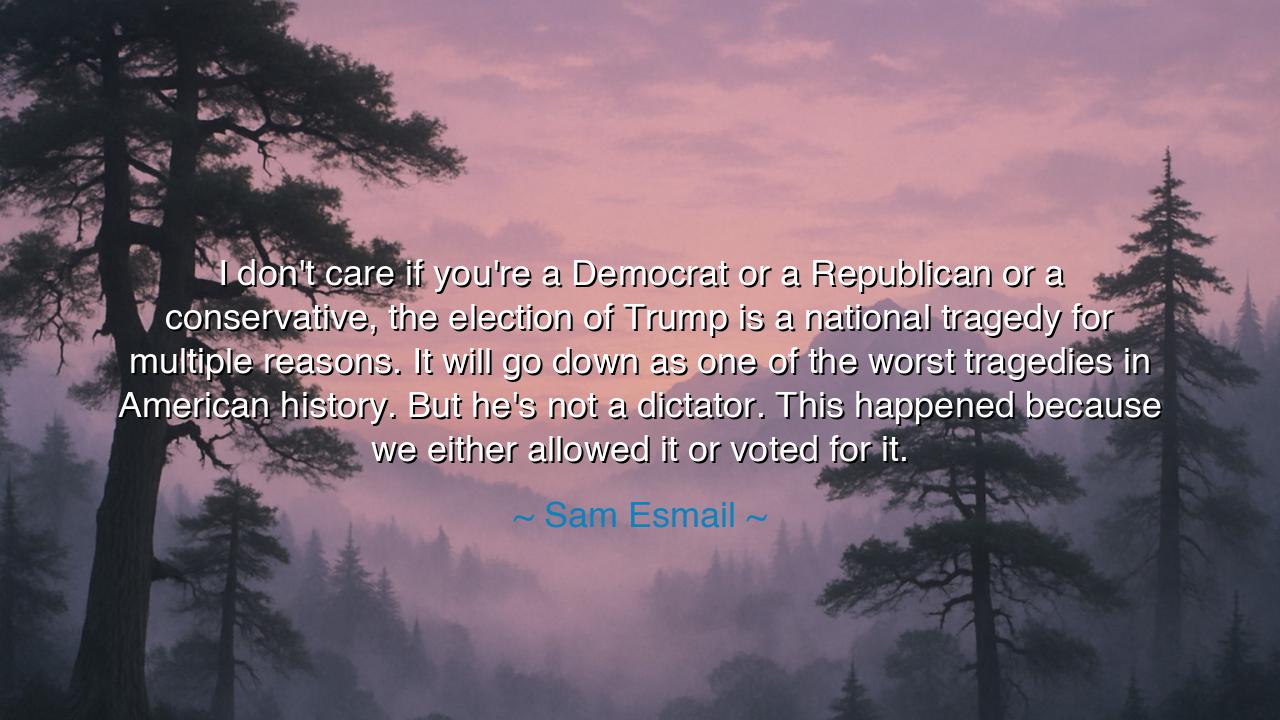
I don't care if you're a Democrat or a Republican or a
I don't care if you're a Democrat or a Republican or a conservative, the election of Trump is a national tragedy for multiple reasons. It will go down as one of the worst tragedies in American history. But he's not a dictator. This happened because we either allowed it or voted for it.






The words of Sam Esmail, creator of stories that peel back the masks of modern power, strike with the force of both lamentation and warning: “I don’t care if you’re a Democrat or a Republican or a conservative, the election of Trump is a national tragedy for multiple reasons. It will go down as one of the worst tragedies in American history. But he’s not a dictator. This happened because we either allowed it or voted for it.” Within these words lies not merely a judgment of politics, but a meditation on responsibility, complacency, and the eternal struggle between freedom and the shadows that rise when citizens forget their duty to the truth.
In the ancient days, when empires rose and fell beneath the feet of their own people, the philosophers warned that no tyrant ever seized power alone. It was the silence of the many that paved his road, the indifference of the righteous that built his throne. Esmail’s words echo this old wisdom: that no ruler governs without the consent—explicit or passive—of those he rules. He does not call one faction guilty, nor another innocent; he calls upon all to gaze into the mirror and see their own reflection in the tragedy of their nation. For the true danger to a republic is not a single man, but the sleep of its citizens.
Consider the tale of Rome, the eternal city that once ruled the world. When Julius Caesar crossed the Rubicon and ended the republic, the senators lamented, but too late. They had long abandoned virtue for vanity, debate for decadence. The people, weary of corruption, welcomed power dressed as salvation. And so the republic died—not slain by the sword, but eroded by apathy. In Esmail’s warning, one hears the ghost of Cicero crying again across the centuries: “Freedom dies when citizens trade vigilance for comfort.”
Yet Esmail, in his tempered wisdom, does not cry out that a dictator has risen. He reminds us instead that this was no coup, no sudden conquest of democracy by a single hand. It was a choice. It was the result of millions of small surrenders—the neglect of truth, the hunger for spectacle, the weariness of engagement. Thus the tragedy is deeper than tyranny; it is the tragedy of a people who forgot their power. For in a democracy, every vote is a sword and every silence a wound.
We may find this lesson repeated in every age. Germany, once a nation of poets and thinkers, watched as hatred and fear disguised themselves as order and pride. Hitler did not seize power by force alone—he was elected, cheered, legitimized by the very people he would destroy. The world looked on, thinking, “Surely this cannot last; surely someone will stop it.” But none did, until it was too late. And so the flame of reason was smothered beneath the weight of complicity. Esmail’s words remind us that history never repeats itself exactly, but it rhymes—each verse a warning to those who do not listen.
To the young who inherit this age, remember: liberty is not a gift, but a discipline. It demands that you speak when silence is safer, that you question when conformity is rewarded, that you vote not for comfort but for conscience. Do not look to heroes to save you; you are the stewards of your own freedom. The moment you surrender responsibility, you invite ruin cloaked in the language of leadership. Freedom, like faith, must be renewed every generation, or it will wither into myth.
Thus, the lesson of Esmail’s words is both grave and glorious: that the fate of nations is not written by kings, but by the hearts of their people. No tyrant rises without the trembling of those who should stand firm. And so, let each citizen take up the ancient oath once spoken by the guardians of democracy: “I will not stand aside. I will not close my eyes. The state lives through me.” For only when a people remember that they are the authors of their destiny can they prevent their story from becoming a tragedy once more.






AAdministratorAdministrator
Welcome, honored guests. Please leave a comment, we will respond soon